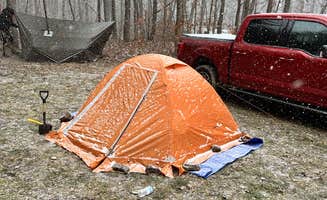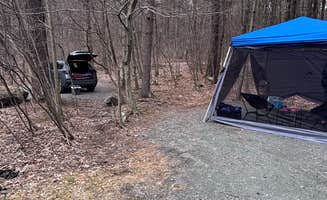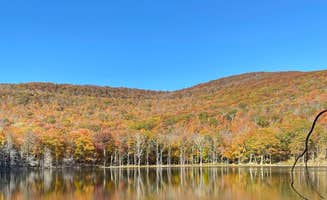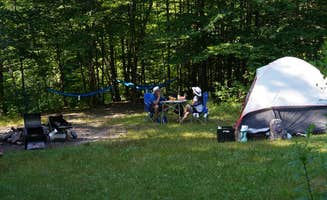Dispersed camping near Fultonham, New York offers opportunities throughout the western Catskills region, where elevations range from 1,200 to 3,000 feet. Weather conditions can shift dramatically between seasons, with summer temperatures averaging 70-85°F during the day and dropping to 50-60°F at night. Several primitive camping areas require advanced preparation as the region experiences significant seasonal variation in accessibility, particularly after heavy rainfall when forest roads can become nearly impassable.
What to do
Fishing access points: At Allaben Primitive Campsites, campers can utilize trails leading to fishing access across the road from the campsite. "Small pond-don't think there are any fish. Picnic table. Fire pit with cooking griddle. Trails to the fishing access across the road," notes Breanne H.
Mountain hiking: For more adventurous campers, the area offers challenging trails leading to significant Catskill peaks. Near Denning Trailhead Peekamoose Primitive Camping, you can access multiple mountain trails. "Great camping spots about 1.5 mile hike in from Denning Trailhead. A lot of spots right by the river. Great spot to camp and then wake up to hike to tabletop/peekamoose mountain," reports Ali B.
Bicycle trails: State forests in the region provide opportunities for mountain biking on forest trails. At Ushers Road State Forest, "This trailhead provides access to bicycle-friendly nature trails. I explored both directions on my bike, riding approximately half a mile down each side. The terrain eventually transitions into a low-lying, swampy area," according to a visitor.
What campers like
Year-round accessibility: Some sites remain accessible throughout winter, allowing for four-season camping experiences. "Was a great location for winter camping. Site easily accessible from road. Beautiful, peaceful, great time!" notes Felix R. about Burnt Rossman State Forest - Westkill Camp.
Streamside camping: Many sites offer the calming presence of water features. At Betty Brook Camp, Robert B. shares, "Love to camp here all year long have been coming to the area for a couple of decades now. Remote. Sometimes you never see anyone. You camp on the stream."
Solitude and remoteness: The primitive nature of camping near Fultonham provides opportunities for genuine wilderness experiences. "It is rather remote, but it is right along West kill road. There's a stream alongside it, a fire pit, and a town about 8 mi away. It's a small town, with just a gas station store," describes Peter about Betty Brook Camp.
What you should know
Road conditions: Access to many dispersed camping areas requires careful navigation and appropriate vehicles. At Duck Pond Campsite, Yae U. advises, "After driving unpaved dirt road for a while, we arrived a surprisingly well maintained beautiful campsites. The pond is small so the mosquitos were not too bad. Just be careful driving in the sometimes rough conditions."
Cell service limitations: Coverage varies significantly throughout the region, with some areas having no service at all. Campers should plan communications accordingly and bring paper maps or downloaded offline maps.
Site availability: Most primitive sites operate on a first-come, first-served basis without reservations. During peak seasons (summer weekends and fall foliage), popular sites may fill quickly, especially those with easier access.
Wildlife awareness: The region hosts black bears, coyotes, and other wildlife. Food storage in vehicles or bear-resistant containers is essential, particularly during spring and summer months when animal activity increases.
Tips for camping with families
Easy access options: For families with young children, look for sites with minimal hiking required. "This spot is right off the road. Nice and quiet. There is enough room for 2 to 3 campers. Parking across the street if it's wet," notes a visitor about Burnt Rossman State Forest.
Swimming opportunities: During summer months, Echo Lake offers swimming options for families. "Lake is surrounded by hills and there is a small lean two with a few campfire spots. Other campsites are scattered and require navigating through small overgrown trails (wear pants)," advises James A.
Bug preparation: Families should pack appropriate insect repellent, particularly for lake and stream sites. "Note, it can get swampy near the edge of the lake so you may want to bring bug spray," recommends Kate about Echo Lake.
Alternative accommodations: When primitive camping proves too challenging, consider the lean-to options. "There are tent sites around the whole lake with fire pits and 1 lean-to site at the end of the trail when you first arrive at the lake," reports a camper about Echo Lake.
Tips from RVers
Site limitations: Most dispersed camping areas near Fultonham accommodate only smaller RVs or vans. "I would not recommend this for large trailers. The site is fairly small, but it's in state park, and there's tons of walking that can be done," cautions Peter about Betty Brook Camp.
Parking considerations: For RV campers, parking surfaces may present challenges in wet conditions. "Parking across the street if it's wet. Entrance is soft," notes a camper about Westkill Camp.
Alternatives for larger rigs: Campers with larger RVs should consider designated campgrounds rather than dispersed sites. Most primitive areas in state forests have limited turning radius and uneven ground unsuitable for larger vehicles.





